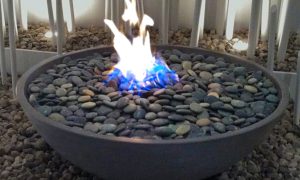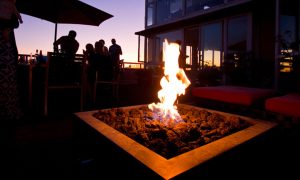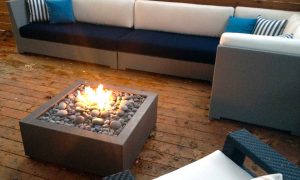Part three of our comparison of fire pits and outdoor fireplaces deals with some of the installation differences and points to consider when deciding which is right for you.
As I’ve said in previous posts, both outdoor fireplaces and fire pits have the ability to create incredible ambiance and coziness for an outdoor space, and are a natural focal point around which the overall spatial design can revolve – but they do this in very different ways. Likewise, the installation and associated costs of these two types of fire features can also be very different.
For the sake of this comparison, I will talk about gas-burning outdoor fireplaces and fire pits (the gas may be natural gas or propane). Wood-burning fireplaces and firepits require somewhat different types of installations, but the basic differences parallel those of their gas-fueled counterparts).
Most contemporary outdoor fireplaces installed in or near cities tend to be natural gas-burning. This means that, first and foremost, you need to have an outdoor gas line. Outdoor gas fireplaces, like the indoor versions from which they evolved, are usually pretty raw – metal boxes meant to be built into a structure. The main difference is that they are weatherproof, all of the key components being stainless steel or brass. These units are designed to provide the fire and the rest is up to you. On one hand, this is great as it means you have total creative freedom. On the other, it also can mean added design and construction costs.
After choosing an outdoor fireplace unit, you need to design an enclosure or ‘wall’ that will house it. This can take on a number of forms: a chimney-like structure, a wall that divides or encloses the space, or you can even just create a low box that is slightly larger than the firebox. You can create a mantel or a very minimal, flush enclosure. Whatever you do, you must ensure that the materials you use are weather and rot-proof in addition to meeting any combustible clearance requirements of the fireplace you select.
The costs associated with building an outdoor gas fireplace include running a gas line and hooking up the fireplace, the cost of the fireplace burner itself, and the labor and materials for the aesthetic elements that you choose to build the fireplace out with.
Fire pits may also be quite involved in their construction if you opt to have one custom-built, but unlike fireplaces, there are also many smaller, self-contained options available.
Custom-built fire pits involve a weather-proof, stainless steel burner component and a decorative housing of some sort. The burner is hidden inside the housing and topped with some kind of media: lava rock, fire-proof stones, glass beads, etc. Like outdoor fireplaces, a concealed gas line can be run to the burner, or many firepit burners can be fueled by a propane tank.
The fire pit housing can be anything from a ring of stones or bricks, a vessel made of metal, stone, or concrete, a table, or a literal pit or depression in the ground. The requirements for the housing are that it be weatherproof, fireproof, and able to withstand drastic changes in temperature. When custom-building a fire pit, it is critical that you comply with local codes and by-laws, as well as the clearance requirements of the burners.
Many of the above fire pit configurations are also available to purchase as complete units including the burner, vessel or enclosure, and top media. All that is required is the fuel source. The costs and configurations of these off-the-shelf products vary greatly, but in general, you get what you pay for.
Fire pits, generally speaking, are simpler and less expensive to create than outdoor fireplaces. They involve less construction, in some cases, as little as placing the fire pit and attaching the fuel source. But the choice of which is right for a particular space and lifestyle comes down to the overall aesthetic experience that you desire. When in doubt, there is no reason why you can’t have both!



